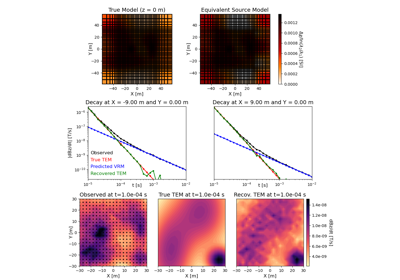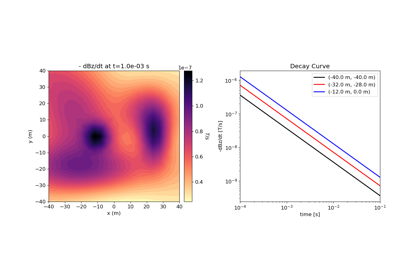simpeg.electromagnetics.viscous_remanent_magnetization.Simulation3DLinear#
- class simpeg.electromagnetics.viscous_remanent_magnetization.Simulation3DLinear(mesh, xi=None, xiMap=None, **kwargs)[source]#
Bases:
BaseVRMSimulationAttributes
The geometric sensitivity matrix for the linear VRM problem.
The characteristic decay matrix for the VRM problem.
A list of solver objects to clean when the model is updated
SimPEG
Counterobject to store iterations and run-times.A list of properties stored on this object to delete when the model is updated
Topography active cells.
Mesh for the simulation.
The inversion model.
True if a model is necessary
Sensitivity refinement radii from sources.
The number of refinement distances.
Path to directory where sensitivity file is stored.
Numerical solver used in the forward simulation.
Solver-specific parameters.
The VRM survey.
Verbose progress printout.
Amalgamated viscous remanent magnetization parameter xi = dchi/ln(tau2/tau1) physical property model.
Derivative of Amalgamated Viscous Remanent Magnetization Parameter xi = dchi/ln(tau2/tau1) wrt the model.
Mapping of the inversion model to Amalgamated Viscous Remanent Magnetization Parameter xi = dchi/ln(tau2/tau1).
Methods
Jtvec(m, v[, f])Compute (Pd*T*A*dxidm)^T * v
Jtvec_approx(m, v[, f])Approximation of the Jacobian transpose times a vector for the model provided.
Jvec(m, v[, f])Compute Pd*T*A*dxidm*v
Jvec_approx(m, v[, f])Approximation of the Jacobian times a vector for the model provided.
fields(m)Computes the fields d = T*A*m
make_synthetic_data(m[, relative_error, ...])Make synthetic data for the model and Gaussian noise provided.
residual(m, dobs[, f])The data residual.
dpred
Galleries and Tutorials using simpeg.electromagnetics.viscous_remanent_magnetization.Simulation3DLinear#

Predict Response from a Conductive and Magnetically Viscous Earth

Method of Equivalent Sources for Removing VRM Responses

Response from a Homogeneous Layer for Different Waveforms
